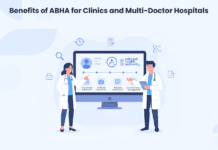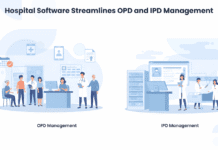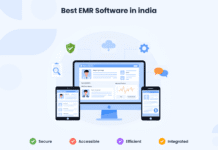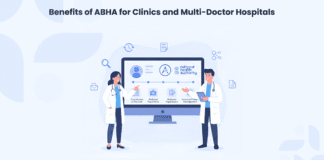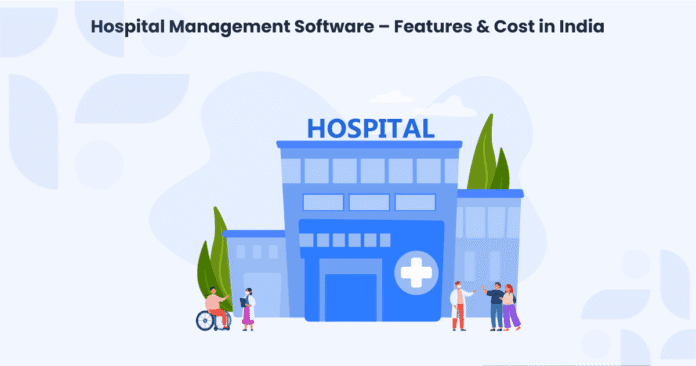
Running a hospital or clinic is tough. There’s a lot to handle: patients, appointments, lab tests, billing, medicines, staff schedules… the list goes on. Without a proper system, it’s easy to get lost in paperwork and chaos.
This is where Healcard Hospital Management Software, one of the best hospital management software in India, comes in, helping hospitals manage everything digitally, more efficiently, and faster. Simply put, HMS is a tool that helps hospitals manage everything digitally, making work faster, reducing errors, and improving patient satisfaction.
In this guide, we’ll explain what hospital management software is, its key features, the cost in India, and how to select the right HMS for your hospital. I’ll keep it simple so any doctor, admin, or hospital manager can understand. Today, hospitals across India are switching to cloud-based hospital management software to streamline operations and improve patient care.
What Is Hospital Management Software?
If you’ve ever wondered what hospital management software is and why it’s becoming essential, here’s a simple way to understand it. It’s a digital tool that helps hospitals and clinics manage their daily work, patients, staff, billing, and reports all in one place.
Instead of juggling paper files or spreadsheets, everything happens online. From booking appointments and storing patient records to generating bills and tracking medicines, HMS keeps it all organized and connected.
Simply put, it streamlines hospital operations, making them faster, more accurate, and less stressful for both staff and patients. Healcard HMS is designed to do exactly that, with a user-friendly interface and seamless integration, making it one of the best hospital management systems available for Indian hospitals.
In simple terms, HMS is part of a broader trend in healthcare management software in India, helping hospitals digitize everything from patient data to billing in one platform.
Why Hospitals in India Need Management Software
Running a hospital without a hospital management system is stressful. Papers pile up, files go missing, mistakes happen, and everyone feels it. Patients become frustrated, staff burn out, and revenue suffers.
Here’s what usually goes wrong when you manage things manually:
- Too much paperwork: Every patient brings files, prescriptions, and lab reports. Keeping track of all this by hand is exhausting.
- Human errors: such as incorrect entries or lost files, are all too common.
- Slow processes: Booking appointments, billing, or tracking medicines takes way longer than it should.
- Compliance headaches: Rules like the Ayushman Bharat Digital Mission (ABDM) are hard to follow without proper systems.
- No clear overview: It’s tough to see trends in revenue, patient flow, or staff performance.
A reliable system like Healcard HMS solves these problems efficiently. It saves time, reduces mistakes, and makes life easier for staff and patients.
Key Features of Hospital Management Software in India
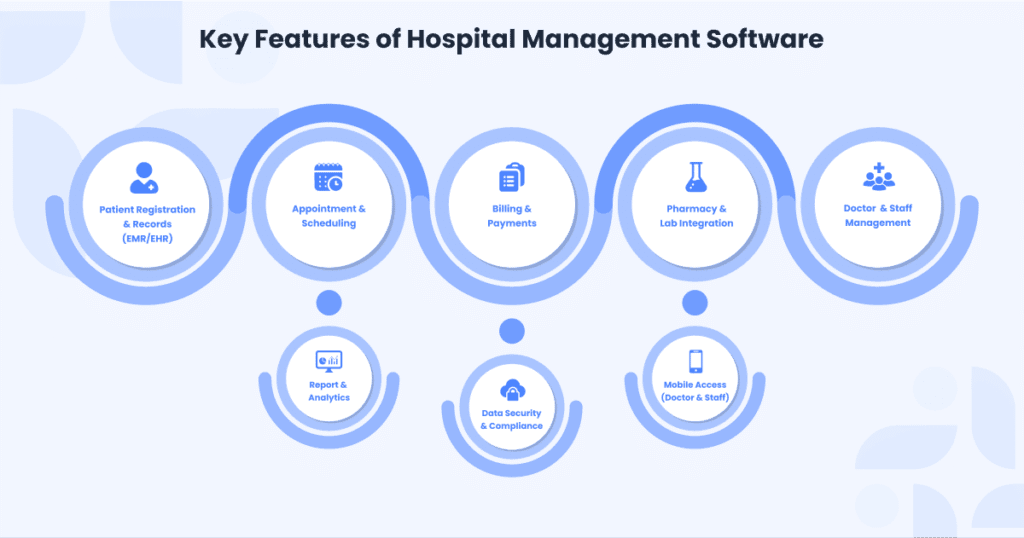
These features of hospital management software are designed to make hospitals more efficient, compliant, and connected.
I. Patient Registration & Records (EMR/EHR)
Every hospital starts with a patient walking in. The hospital management system software makes that first step simple and digital.
- When a patient registers, their details, including name, contact information, age, diagnosis, and doctor, are saved in the system.
- Over time, all their medical history, prescriptions, lab results, and scans are stored digitally.
- Doctors can instantly pull up this record anytime, no more hunting for paper files.
This is one of the most important electronic health record platforms, ensuring doctors have full visibility into patient history.
II. Appointments & Scheduling
No one likes long queues or double-booked slots. The software organizes it all.
- Patients can book appointments online,through the online hospital management system, mobile app, or front desk.
- Doctors’ schedules are updated automatically, avoiding overlaps.
- The system sends SMS or email reminders so patients don’t forget appointments.
III. Billing & Payments
Handling bills manually is stressful, especially when multiple services are involved. HMS automates it.
- Bills are generated automatically after consultation, tests, or pharmacy purchases.
- Discounts, taxes, and insurance claims are applied automatically.
- You can track pending payments or dues in real time.
IV. Pharmacy & Lab Integration
Hospitals with in-house labs and pharmacies benefit hugely from this feature.
- For labs: Test requests are created digitally by the doctor and sent straight to the lab. Results are uploaded back into the patient’s record.
- For pharmacy: When a doctor prescribes medicine, it reflects instantly in the pharmacy system. Staff can check availability and issue medicine fast.
V. Doctor & Staff Management
Hospitals rely on people, and managing them efficiently makes everything smoother.
- The system tracks doctor schedules, duties, and patient loads.
- Staff attendance, shifts, and leaves are recorded digitally.
- You can also assign roles and permissions (for example, only doctors see prescriptions).
VI. Inventory & Stock Management
Hospitals deal with hundreds of items daily, from gloves and syringes to high-value equipment.
- The system tracks what’s in stock, what’s used, and what needs restocking.
- You get automatic alerts before something runs out.
- You can even track expiry dates for medicines.
VII. Reports & Analytics
Think of this as your hospital’s dashboard, a feature every modern hospital management software should include for a real-time view..
- You can generate reports on revenue, patient visits, top-performing departments, or outstanding bills.
- See which services are most used, which doctors are busiest, and how efficiently your staff is working.
- Data is shown in graphs and charts for easy understanding.
VIII. Telemedicine & Online Consultation
Digital healthcare is booming, and HMS makes it possible for hospitals to reach patients remotely.
- Patients can book online consultations and meet doctors via video call.
- Doctors can share digital prescriptions, lab requests, and follow-up instructions.
- Patients can pay online and access their records from home.
IX. Data Security & Compliance
Hospitals handle sensitive patient information, so safety is critical.
- HMS encrypts all data, ensuring only authorized users can access it.
- It follows international and Indian healthcare data regulations like HIPAA and ABDM.
- Cloud backups keep your data safe even during system failures.
X. Mobile Access (For Doctors & Staff)
Many modern systems have mobile apps or mobile-friendly dashboards.
- Doctors can check patient details, reports, or prescriptions from anywhere.
- Staff can mark attendance, update records, or manage tasks on the go.
XI. Multi-Department Integration (Everything Works Together)
A powerful HMS connects every department, OPD, IPD, billing, lab, pharmacy, and admin in one place.
- When a doctor updates a patient’s status, the billing team, lab, and pharmacy all see it instantly.
- No need for phone calls or paper slips between departments.
Benefits of Using Hospital Management Software
Hospital Management Software isn’t just about going digital; it changes how your hospital runs day to day. Here’s how it helps:
- Saves time: Routine tasks like billing, appointment scheduling, and record keeping happen automatically. What used to take hours now takes minutes.
- Reduces errors: Fewer mistakes in prescriptions, lab reports, and billing mean safer care and happier patients.
- Improves efficiency: Staff spend less time on paperwork and more time with patients.
- Better decisions: Real-time reports show trends in patient flow, revenue, and staff performance, helping managers make smarter choices.
- Easier compliance: Rules and regulations, like ABHA or other local standards, are handled by the system without extra effort.
- Smooth operations: Departments talk to each other instantly, lab, pharmacy, billing, and doctors, so nothing gets delayed.
With Healcard HMS, all these benefits are available in one easy-to-use hospital management system, helping hospitals of every size work smarter and faster. Overall, the benefits of hospital management software go beyond convenience; they directly impact patient satisfaction and hospital profitability.
How Hospital Management Systems Improve Healthcare
The main goal of developing a Hospital Management System (HMS) is to make hospitals work better, faster, and smarter.
An effective HMS helps to:
- Simplify daily workflows for doctors and nurses
- Cut down unnecessary administrative costs
- Boost both clinical and operational efficiency
- Minimize human errors that often happen with manual records
- Deliver a smoother, more satisfying patient experience
Beyond that, HMS connects all departments from reception and pharmacy to labs and billing so they can work together seamlessly.
It brings together scattered data like lab results, medical supplies, appointments, and patient histories into one place. This makes it easier for hospital staff to stay organized, track performance, and respond quickly when it matters most.
In short, HMS creates a more connected, responsive, and efficient healthcare environment for everyone involved: doctors, patients, and administrators alike.
Types of Hospital Management Software
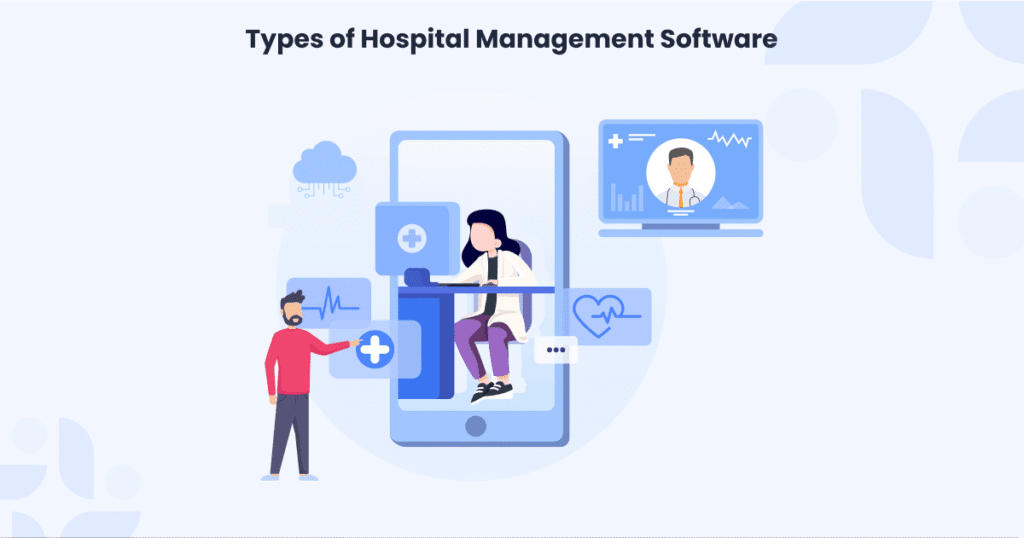
Hospitals can choose different types of hospital software or HMS depending on their size, budget, and needs. Here’s an easy comparison
| Type of HMS | How It Works | Pros | Cons | Best For |
| Cloud-Based | Runs online, no servers needed. You access it via computer, tablet, or phone. | Easy to set up, low upfront cost, accessible from anywhere. | Depends on internet connection; monthly or yearly subscription fees. | Small clinics and mid-sized hospitals. |
| On-Premise | Installed on the hospital’s own computers and servers. | Full control of data, works without internet, and is customizable. | High upfront cost, needs IT staff for maintenance. | Large hospitals or multi-specialty hospitals. |
| Hybrid | Combines cloud and on-premise. Sensitive data is stored locally, and other functions run online. | Flexibility, better security than full cloud, and it can scale. | Setup can be more complex and may need IT support. | Medium to large hospitals. |
| Modular / Departmental | Focuses on specific areas like billing, lab, or pharmacy. Modules can be added later. | Start small and expand gradually, lower initial cost. | Doesn’t cover full hospital operations initially. | Hospitals are looking for step-by-step digital adoption. |
In simple terms:
- This kind of cloud-based hospital software is becoming very popular in India because it’s easy to set up and scale.
- However, if you want full control over data and don’t mind the upfront investment, an on-premise system can be the best HMS for hospitals in India that need high customization.
- Hybrid systems are often used by mid-size facilities that want the flexibility of cloud-based hospital management software without compromising on data control.
- Modular: Start with one department and grow as needed.
Tips for Successful HMS Implementation
Even the best software, like Healcard HMS, needs proper setup and training to deliver the best results. Here’s how to do it right:
- Train your staff: Make sure everyone knows how to use the system, from doctors to front-desk staff.
- Start small: Don’t launch everything at once. Begin with one department or module, then expand gradually.
- Clean your data: Make sure old patient records and files are digitized correctly before going live.
- Choose the right vendor: Pick a provider that offers reliable support, updates, and guidance.
- Monitor and adjust: Keep an eye on how things are working, gather feedback, and tweak workflows to make the system even better.
This approach ensures a smooth transition and that the software truly makes hospital operations easier.
Cost vs ROI (Return on Investment)
Investing in a hospital management system in India might feel expensive at first. But the real question is, what do you get back? The right HMS saves time, reduces errors, and improves patient satisfaction, which often pays for itself within months
Here’s a simple breakdown:
| Hospital Size | Estimated Cost (India) | What You Get / ROI |
| Small Clinic (1–5 doctors) | ₹1,000 – ₹5,000 / month | Faster billing, fewer errors, easy appointments, improved patient satisfaction |
| Medium Hospital (50–100 beds) | ₹20,000 – ₹1,00,000 / month | Optimized staff schedules, integrated lab & pharmacy, faster revenue collection, reduced paperwork |
| Large Hospital (100+ beds) | ₹1,00,000+ / month / One-time high setup | Full digital control, department integration, advanced analytics, better patient flow, high ROI over time |
In simple words:
- Small clinics: Saves time, reduces errors, and makes visits smoother for patients. Even a small monthly subscription can pay for itself quickly.
- Medium hospitals: Let you manage staff, labs, pharmacy, and billing all in one place. Less confusion, more organized work, and better revenue.
- Large hospitals: Bigger upfront cost, but full integration across all departments improves efficiency and leads to long-term savings.
Even small clinics using Healcard HMS quickly see faster billing, fewer errors, and happier patients, making it a worthwhile investment.
Government Push for Digital Healthcare in India
The Indian government is making a big move toward digital healthcare and promoting hospital information management systems through the Ayushman Bharat Digital Mission (ABDM).
Under this, every patient can create an ABHA ID, a digital health ID that stores their medical records online. Hospitals connected to this system can access and update records securely, saving time and reducing paperwork.
The goal is simple: make healthcare in India more connected, transparent, and efficient.
This government move aligns perfectly with the rise of healthcare management software in India, making it easier for hospitals to adopt digital solutions like Healcard HMS.
How to Choose the Right HMS
Don’t just go for the cheapest option; choose the best hospital management software that fits your needs and workflow.If you’re wondering how to choose the right HMS for your hospital, here’s what you should look for.
- Easy to use: Your staff should be able to learn it quickly without extra training.
- Scalable: The system should grow with your hospital, not hold it back.
- Secure and compliant: It must protect patient data and adhere to local healthcare regulations.
- Customizable: Every hospital works differently. The software should adapt to your process.
- Good support: Quick help when something goes wrong makes all the difference.
- Integration-ready: It should easily connect with labs, pharmacies, and insurance systems.
- Reasonable cost: Find the balance between features and budget.
Healcard HMS is one of the best HMS for hospitals in India, offering a secure, scalable, and easy-to-use system that fits hospitals of all sizes.
FAQ: Hospital Management System
HMS is a digital system that helps hospitals and clinics manage everything patient records, appointments, billing, labs, pharmacy, and staff, quickly and efficiently, replacing messy paperwork.
Managing a hospital manually is time-consuming and prone to errors. HMS helps reduce mistakes, speeds up appointments, organizes billing, tracks staff, and improves patient care. It also helps hospitals comply with regulations like ABDM.
HMS saves time by automating tasks, cutting errors, organizing staff, connecting departments, and giving instant insights for smarter decisions.
Yes. Modern HMS allows hospitals to offer online consultations, share digital prescriptions, manage follow-ups, and maintain patient records all remotely.
A good HMS keeps patient data safe with encryption, gives access only to the right staff, follows healthcare rules like HIPAA and ABDM, and backs up data to the cloud to prevent loss.
When picking HMS, make sure it’s easy to use, secure, customizable, can grow with you, connects with labs and pharmacies, and fits your budget. Always try a demo first. Healcard covers all this.
HMS may cost upfront, but it quickly saves time, cuts mistakes, makes patients happier, and speeds up payments. Many hospitals see returns in just a few months.
With ABDM, hospitals can use ABHA IDs to view and update patient records digitally, making healthcare simpler and more connected.
HMS can be tailored to any facility, small clinic, medium hospital, or large hospital, with features and pricing that fit its size and needs.
Yes. It automates billing, manages inventory, and tracks pharmacy records.
Yes, most HMS software keeps data secure with password protection and backups.
No. It helps staff work faster and focus on patient care rather than paperwork.
Conclusion
A hospital management system is more than just a tool; it’s the backbone of a modern, efficient hospital. It keeps patient records, appointments, billing, labs, and pharmacy all in one place, making daily operations faster and easier.
A good HMS saves time, reduces mistakes, and improves patient care, whether it’s a small clinic or a big hospital. With government programs like ABHA IDs and ABDM promoting digital healthcare, now is the right time to switch. Healcard HMS helps hospitals stay organized, compliant, and efficient, all on one simple platform.

